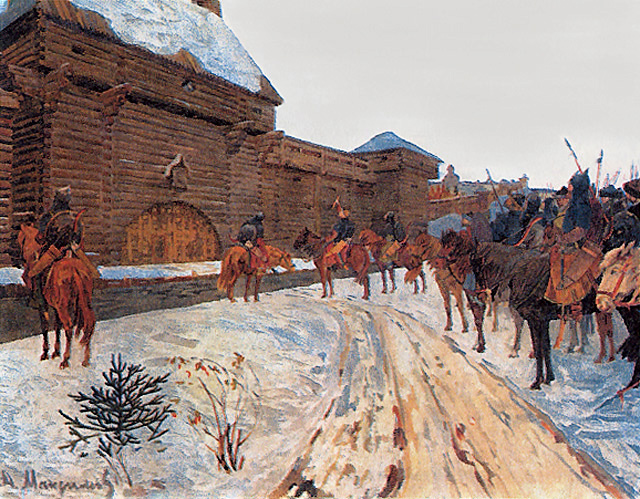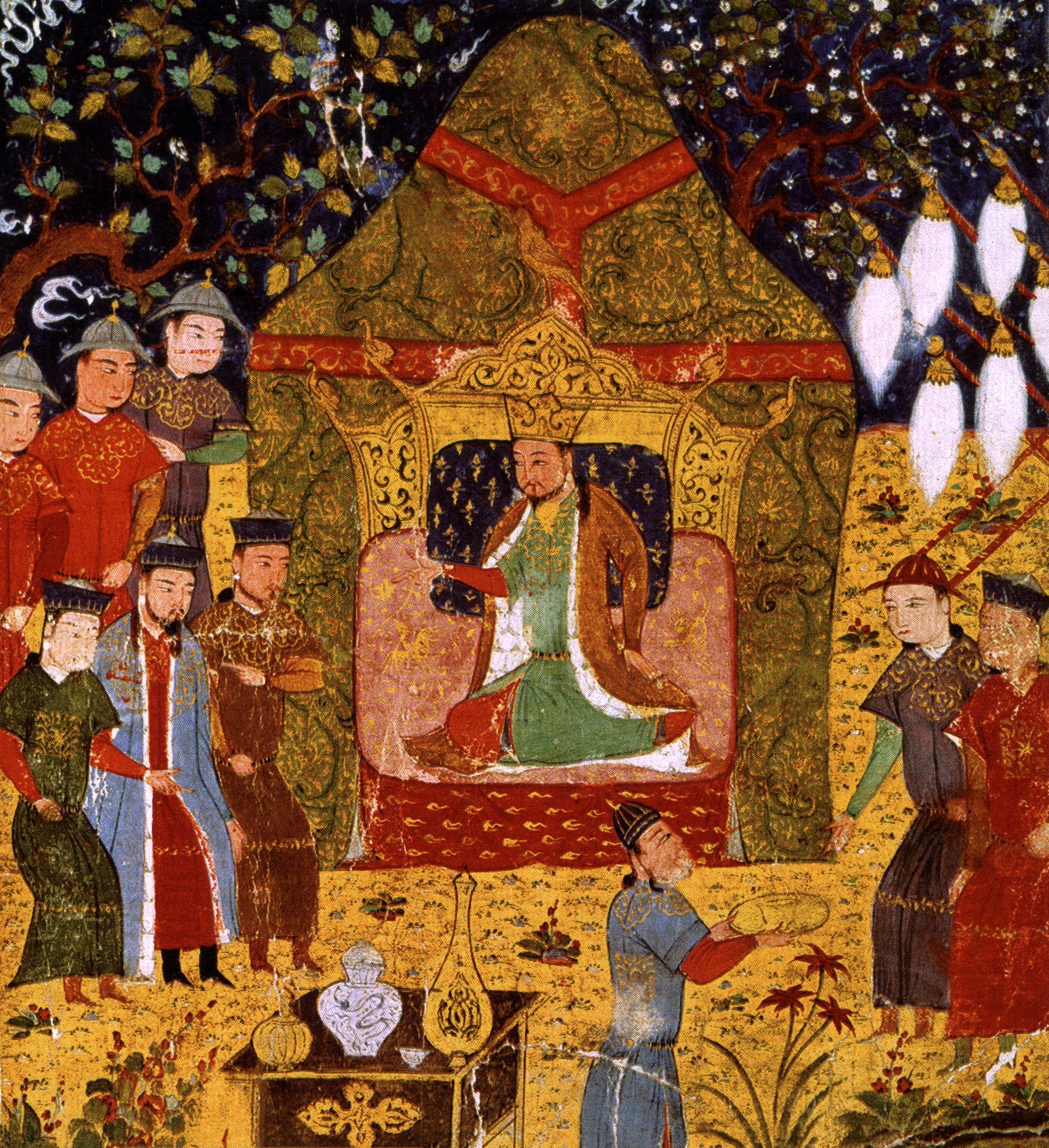|
Chinese Emperors Family Tree (late)
This is a family tree of Chinese monarchs from the Yuan dynasty to the end of the Qing dynasty. __TOC__ Yuan dynasty and Northern Yuan The following is the Yuan dynasty family tree. Genghis Khan founded the Mongol Empire in 1206. The empire became split beginning with the succession war of his grandsons Kublai Khan and Ariq Boke. Kublai Khan, after defeating his younger brother Ariq Boke, founded the Yuan dynasty of China in 1271. The dynasty was overthrown by the Ming dynasty during the reign of Ukhaantu Khan, Emperor Huizong of Yuan, Toghun Temür in 1368, but it survived in the Mongolian Plateau, known as the Northern Yuan; years of reign over the Northern Yuan (up to 1388) are given in brackets. Long before Kublai Khan announced the dynastic name "Yuan dynasty, Great Yuan" in 1271, Khagans (Great Khans) of the Mongol State (''Yeke Mongγol Ulus'') already started to use the Chinese title of Emperor of China, Emperor () practically in the Chinese language since Spring 120 ... [...More Info...] [...Related Items...] OR: [Wikipedia] [Google] [Baidu] |
Yuan Dynasty
The Yuan dynasty (), officially the Great Yuan (; xng, , , literally "Great Yuan State"), was a Mongol-led imperial dynasty of China and a successor state to the Mongol Empire after its division. It was established by Kublai, the fifth khagan-emperor of the Mongol Empire from the Borjigin clan, and lasted from 1271 to 1368. In orthodox Chinese historiography, the Yuan dynasty followed the Song dynasty and preceded the Ming dynasty. Although Genghis Khan had been enthroned with the Han-style title of Emperor in 1206 and the Mongol Empire had ruled territories including modern-day northern China for decades, it was not until 1271 that Kublai Khan officially proclaimed the dynasty in the traditional Han style, and the conquest was not complete until 1279 when the Southern Song dynasty was defeated in the Battle of Yamen. His realm was, by this point, isolated from the other Mongol-led khanates and controlled most of modern-day China and its surrounding areas, including ... [...More Info...] [...Related Items...] OR: [Wikipedia] [Google] [Baidu] |
Güyük Khan
Güyük (also Güyug;; ''c''. March 19, 1206 – April 20, 1248) was the third Khagan-Emperor of the Mongol Empire, the eldest son of Ögedei Khan and a grandson of Genghis Khan. He reigned from 1246 to 1248. Appearance According to Giovanni da Pian del Carpine, Güyük was of "medium stature, very prudent and extremely shrewd, and serious and sedate in his manners." Early life Güyük received military training and served as an officer under his grandfather Genghis Khan and later his father Ögedei Khan (after the death of Genghis in 1227). He married Oghul Qaimish of the Merkit clan. In 1233, Güyük, along with his maternal cousin Alchidai and the Mongol general Tangghud, conquered the short-lived Dongxia Kingdom of Puxian Wannu, who was a rebellious Jin official, in a few months. After the death of Güyük's uncle Tolui, Ögedei proposed that Sorghaghtani, the widow of Tolui, marry his son Güyük. Sorghaghtani declined, saying that her prime responsibility was to he ... [...More Info...] [...Related Items...] OR: [Wikipedia] [Google] [Baidu] |
Tolui Khan
Tolui (also Toluy, Tului; , meaning: "the mirror"; – 1232) was a Mongol empire, Mongol khan, the fourth son of Genghis Khan by his chief khatun, Börte. At his father's death in 1227, his ''Orda (organization), ulus'', or territorial inheritance, was the Mongol homelands on the Mongolian Plateau, and he also served as civil administrator until 1229, the time it took to confirm Ögedei Khan, Ögedei as the second Khagan, Great Khan of the Mongol Empire (1206–1368). Before that, he had served with distinction in the campaigns against the Jin dynasty (1115–1234), Jin dynasty, the Mongol conquest of Western Xia, Western Xia and the Khwarezmid Empire, where he was instrumental in the capture and massacre at Merv and Nishapur. He is a direct ancestor of most of the Ilkhanids. Tolui never used the title of Khagan himself; neither Genghis Khan nor his immediate three successors would ever use any Chinese era name, era names unlike the neighboring Zhongyuan, Central Plain dynastie ... [...More Info...] [...Related Items...] OR: [Wikipedia] [Google] [Baidu] |
Tolui
Tolui (also Toluy, Tului; , meaning: "the mirror"; – 1232) was a Mongol khan, the fourth son of Genghis Khan by his chief khatun, Börte. At his father's death in 1227, his ''Orda (organization), ulus'', or territorial inheritance, was the Mongol homelands on the Mongolian Plateau, and he also served as civil administrator until 1229, the time it took to confirm Ögedei Khan, Ögedei as the second Khagan, Great Khan of the Mongol Empire (1206–1368). Before that, he had served with distinction in the campaigns against the Jin dynasty (1115–1234), Jin dynasty, the Mongol conquest of Western Xia, Western Xia and the Khwarezmid Empire, where he was instrumental in the capture and massacre at Merv and Nishapur. He is a direct ancestor of most of the Ilkhanids. Tolui never used the title of Khagan himself; neither Genghis Khan nor his immediate three successors would ever use any Chinese era name, era names unlike the neighboring Zhongyuan, Central Plain dynasties in the south ... [...More Info...] [...Related Items...] OR: [Wikipedia] [Google] [Baidu] |
Töregene Khatun
Töregene Khatun (also Turakina, , ) (d. 1246) was the Great Khatun and regent of the Mongol Empire from the death of her husband Ögedei Khan in 1241 until the election of her eldest son Güyük Khan in 1246. Background Töregene was born into the Naiman tribe. Her first husband was a member of the Merkit clan. Some sources state that his name was Qudu (d. 1217), son of Toqto'a Beki of the Merkits.C.P. Atwood ''Encyclopedia of Mongolia and the Mongol Empire'', p. 544 However, Rashid-al-Din Hamadani named her first husband as Dayir Usun of the Merkits. When Genghis conquered the Merkits in 1204, he gave Töregene to Ögedei as his second wife. While Ögedei's first wife Boraqchin had no sons, Töregene gave birth to five sons, Güyük, Kötän, Köchü, Qarachar, and Qashi (father of Kaidu). She eclipsed all of Ögedei's wives and gradually increased her influence among the court officials. But Töregene still resented Ögedei's officials and the policy of centralizing ... [...More Info...] [...Related Items...] OR: [Wikipedia] [Google] [Baidu] |
Ögedei Khan
Ögedei Khagan (also Ogodei;, Mongolian: ''Ögedei'', ''Ögüdei''; – 11 December 1241) was second khagan-emperor of the Mongol Empire. The third son of Genghis Khan, he continued the expansion of the empire that his father had begun. Born in 1186 AD, Ögedei fought in numerous battles during his father's rise to power. After being granted a large appanage and taking a number of wives, including Töregene, he played a prominent role in the Mongol invasion of the Khwarazmian Empire. When his older brothers Jochi and Chagatai quarrelled over strategies when besieging Gurganj, Genghis appointed Ögedei sole commander; his successful capture of the city in 1221 ensured his military reputation. He was confirmed as heir after further infighting between his elder brothers led to both being excluded from succession plans. Genghis died in 1227, and Ögedei was elected as khagan in 1229, after a two-year regency led by his younger brother Tolui. As khan, Ögedei pursued the ... [...More Info...] [...Related Items...] OR: [Wikipedia] [Google] [Baidu] |
Chagatai Khan
Chagatai Khan ( Mongolian: ''; Čaɣatay''; mn, Цагадай, translit=Tsagadai; chg, , ''Čaġatāy''; ug, چاغاتاي خان, ''Chaghatay-Xan''; zh, 察合台, ''Chágětái''; fa, , ''Joghatây''; 22 December 1183 – 1 July 1242) was the second son of Genghis Khan and Börte. He inherited most of what are now five Central Asian states after the death of his father. He was also appointed by Genghis Khan to oversee the execution of the Yassa, the written code of law created by Genghis Khan. Under Genghis Khan Very little is known about Chagatai's earlier life. He was the second son of Genghis Khan and Börte. Chagatai was considered hot-headed and somewhat temperamental by his relatives, because of his attitude of non-acceptance of Jochi as a full-brother. He was the most vocal about this issue among his relations. He was assigned 4 mingghans (led by Qarachar of Barlas, Kököchü of Baarin, Müge of Jalairs and Idiqudai Noyan) and an appanage around Altai Mount ... [...More Info...] [...Related Items...] OR: [Wikipedia] [Google] [Baidu] |
Juchi Khan
Jochi Khan ( Mongolian: mn, Зүчи, ; kk, Жошы, Joşy جوشى; ; crh, Cuçi, Джучи, جوچى; also spelled Juchi; Djochi, and Jöchi c. 1182– February 1227) was a Mongol army commander who was the eldest son of Temüjin (aka Genghis Khan), and presumably one of the four sons by his principal wife Börte, though issues concerning his paternity followed him throughout his life. An accomplished military leader, he participated in his father's conquest of Central Asia, along with his brothers and uncles. Early life There is some question as to Jochi's true paternity. Shortly after Börte's marriage to Temüjin (later to become Genghis Khan), she was abducted by members of the Mergid confederation. She was given to a certain Chilger Bökh, who was the brother of the Yehe Chiledu, as a spoil of war. She remained in Chilger Bökh's captivity for a few months before she was recovered by Temüjin. Shortly afterwards she gave birth to Jochi. By all accounts, Temüji ... [...More Info...] [...Related Items...] OR: [Wikipedia] [Google] [Baidu] |
Jochi
Jochi Khan ( Mongolian: mn, Зүчи, ; kk, Жошы, Joşy جوشى; ; crh, Cuçi, Джучи, جوچى; also spelled Juchi; Djochi, and Jöchi c. 1182– February 1227) was a Mongol army commander who was the eldest son of Temüjin (aka Genghis Khan), and presumably one of the four sons by his principal wife Börte, though issues concerning his paternity followed him throughout his life. An accomplished military leader, he participated in his father's conquest of Central Asia, along with his brothers and uncles. Early life There is some question as to Jochi's true paternity. Shortly after Börte's marriage to Temüjin (later to become Genghis Khan), she was abducted by members of the Mergid confederation. She was given to a certain Chilger Bökh, who was the brother of the Yehe Chiledu, as a spoil of war. She remained in Chilger Bökh's captivity for a few months before she was recovered by Temüjin. Shortly afterwards she gave birth to Jochi. By all accounts, Temüji ... [...More Info...] [...Related Items...] OR: [Wikipedia] [Google] [Baidu] |






